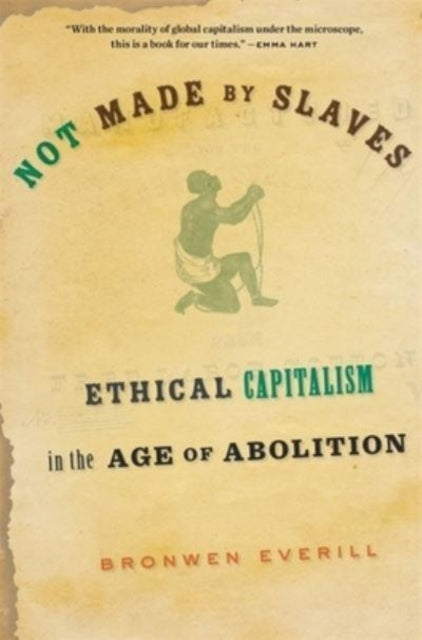Bronwen Everill
Not Made by Slaves: Ethical Capitalism in the Age of Abolition
Not Made by Slaves: Ethical Capitalism in the Age of Abolition
YOU SAVE £3.63
- Condition: Brand new
- UK Delivery times: Usually arrives within 2 - 3 working days
- UK Shipping: Fee starts at £2.39. Subject to product weight & dimension
Bulk ordering. Want 15 or more copies? Get a personalised quote and bigger discounts. Learn more about bulk orders.
Couldn't load pickup availability
- More about Not Made by Slaves: Ethical Capitalism in the Age of Abolition
In the 19th century, abolitionist businesses in West Africa used new ideas of supply and demand, consumer credit, and branding to make the case for ethical capitalism. Consumers became the moral compass of capitalism, but ethical trade had unintended consequences, such as expanding the reach of colonial enterprises. East India Sugar Not Made by Slaves is a reminder of the moral dilemmas of relying on consumer self-interest to transform global capitalism.
Format: Paperback / softback
Length: 328 pages
Publication date: 01 February 2023
Publisher: Harvard University Press
“Everill repositions West Africa as central to the broader Atlantic story of 18th and 19th century economic morality, its relationship with commercial ethics, and the expansion of capitalism.” — Financial Times
“Offers a penetrating new perspective on abolition in the British Empire by spotlighting a particular cast of characters: the commercial abolitionists in West Africa who fashioned a consumer-focused, business-friendly antislavery ethics. These figures sought to prove the moral and economic superiority of non-slave labor while profiting from the transition away from slavery…Impressive.” — Jacobin
“East India Sugar Not Made By Slaves.” With these words inscribed on a sugar bowl, nineteenth-century consumers were reminded of their power to change the global economy. Determined to strike at the heart of the slave trade, abolitionist businesses throughout the Atlantic used new ideas of supply and demand, consumer credit, and branding to make the case for ethical capitalism. Consumers became the moral compass of capitalism as companies in West Africa, including Macaulay & Babington and Brown & Ives, developed clever new tactics to make “legitimate” commerce pay. Yet ethical trade was not without its problems. The search for goods “not made by slaves” unwittingly expanded the reach of colonial enterprises in the relentless pursuit of cheap labor. Not Made by Slaves captures the moral dilemmas roiling the early years of global consumer society and is a stark reminder of the unintended consequences of relying on consumer self-interest.
East India Sugar Not Made By Slaves
In the early 19th century, a sugar bowl with the inscription “East India Sugar Not Made By Slaves” was a powerful symbol of consumer power and the fight against slavery. The abolitionist movement in the Atlantic world was gaining momentum, and businesses were using new ideas of supply and demand, consumer credit, and branding to make the case for ethical capitalism. Consumers became the moral compass of capitalism, and companies in West Africa, including Macaulay & Babington and Brown & Ives, developed clever new tactics to make “legitimate” commerce pay.
However, ethical trade was not without its problems. The search for goods “not made by slaves” unwittingly expanded the reach of colonial enterprises in the relentless pursuit of cheap labor. The sugar bowl served as a reminder of the unintended consequences of relying on consumer self-interest and the need for businesses to consider the social and environmental impact of their operations.
East India Sugar Not Made By Slaves captures the moral dilemmas roiling the early years of global consumer society and is a stark reminder of the unintended consequences of relying on consumer self-interest. It is a valuable contribution to our understanding of the complex relationship between consumers, producers, and the global economy in the 19th century.
Weight: 380g
Dimension: 155 x 236 x 25 (mm)
ISBN-13: 9780674292345
This item can be found in:
UK and International shipping information
UK and International shipping information
UK Delivery and returns information:
- Delivery within 2 - 3 days when ordering in the UK.
- Shipping fee for UK customers from £2.39. Fully tracked shipping service available.
- Returns policy: Return within 30 days of receipt for full refund.
International deliveries:
Shulph Ink now ships to Australia, Belgium, Canada, France, Germany, Ireland, Italy, India, Luxembourg Saudi Arabia, Singapore, Spain, Netherlands, New Zealand, United Arab Emirates, United States of America.
- Delivery times: within 5 - 10 days for international orders.
- Shipping fee: charges vary for overseas orders. Only tracked services are available for most international orders. Some countries have untracked shipping options.
- Customs charges: If ordering to addresses outside the United Kingdom, you may or may not incur additional customs and duties fees during local delivery.


